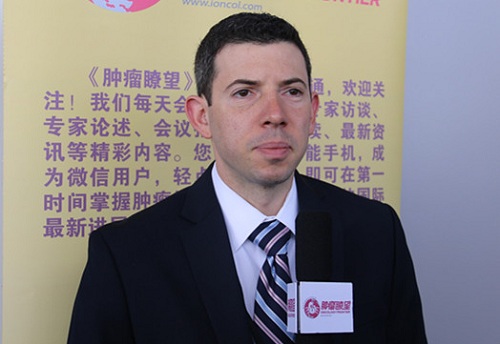[ASCO2014]肿瘤免疫疗法的当前地位及毒副作用管理——Evan J. Lipson博士访谈
专家简介:Evan J. Lipson是约翰霍普金斯基梅尔癌症中心的黑色素瘤学家,其研究兴趣在于探索各期黑色素瘤的新治疗方法,特别是免疫疗法,如癌症疫苗和免疫检测点抑制剂联合应用的优化。
 Evan J. Lipson博士 约翰霍普金斯大学医学院约翰霍普金斯基梅尔癌症中心
Evan J. Lipson博士 约翰霍普金斯大学医学院约翰霍普金斯基梅尔癌症中心
专家简介:Evan J. Lipson是约翰霍普金斯基梅尔癌症中心的黑色素瘤学家,其研究兴趣在于探索各期黑色素瘤的新治疗方法,特别是免疫疗法,如癌症疫苗和免疫检测点抑制剂联合应用的优化。
<Oncology Frontier>: Could you summarize the role and clinical application of immunotherapy in the field of oncology at the present time?
Dr Lipson: Immuno-oncology is emerging as the fourth pillar of oncology treatment in addition to surgery, radiation and chemotherapy. The benefits of immunotherapies are that they often produce long-term durable antitumor responses in patients with advanced cancers. For example, in patients who have received anti-CTLA-4 for advanced melanoma, we have seen that over several years, patients have been able to keep their disease under control because the immune system has been educated about how to keep the tumors from progressing.
《肿瘤瞭望》:您能简单概括一下目前免疫治疗在肿瘤学领域中的地位及其临床应用吗?
Dr. Lipson:免疫治疗是目前除手术、放疗和化疗之外,第四个肿瘤治疗的主要方法。免疫治疗的好处在于它在晚期肿瘤患者中仍可以产生持久的抗肿瘤作用。例如,在接受抗CTLA-4治疗的晚期黑色素瘤患者中,我们已经证实治疗几年之后患者的病情仍然能够控制,这是因为经过治疗后患者的免疫系统“学会了”如何避免肿瘤进展。
<Oncology Frontier>: Immune checkpoint blockade is a more recent approach to immunotherapy. What changes have checkpoint blockade brought to immunotherapy?
Dr Lipson: Immune checkpoint blockade agents are drugs that modify regulatory proteins that exist in the immune environment and what they do is unleash the power of the immune system to affect tumor control. The immune system has to be regulated and it is tightly regulated by these immune checkpoint regulatory molecules. The drugs we are using, the checkpoint blockade agents, tilt the balance so that the immune system now understands that the cancer is something that is foreign and that it should be attacked in the body and not left alone to grow. The tumor can fool the immune system into thinking it is a normal part of the body when it should in fact be being quashed by the immune system.
《肿瘤瞭望》:免疫检验点阻滞是一种新兴的免疫治疗手段。免疫检验点阻断究竟为免疫治疗带来了何种改变?
Dr. Lipson:免疫检验点阻滞剂是可以修饰免疫环境中的调节蛋白的一类药物,通过激活免疫系统的功能达到控制肿瘤的目的。免疫系统必须经过调控,一般都是受到这些免疫检验点调节分子的紧密调控。我们所使用的药物,即检验点阻滞剂,正是打破了这一调控的平衡,使机体免疫系统认识到肿瘤其实是外来物种,必须从体内清除而不能放任其生长。肿瘤理应被免疫系统清除时,但肿瘤却能迷惑免疫系统,使其认为肿瘤是机体正常的一部分。
<Oncology Frontier>: The monoclonal antibodies interfering with CTLA-4, PD-1-PD-L1 and TIM-3-GAL9 belong to the checkpoint inhibitors. What is your opinion on combination therapies?
Dr Lipson: Combination therapies are the next step in the testing of these agents. The checkpoint inhibitors that you mentioned are some of the candidates that are being trialed at the moment. For example, a combination of ipilimumab (which is a CTLA-4 blocker) and nivolumab (which is a PD-1 blocker) was published last year in the New England Journal. It was a small trial, but showed that perhaps the response rates to the combination of those two medications was higher than using either one separately. What is under investigation right now is a phase III trial of patients with metastatic melanoma, one-third of whom will receive nivolumab alone, another third receive CTLA-4 blockade alone and the remaining third of the patients will receive combination therapy. Those trial results will be expected in the next couple of years and will probably form the foundation for what will be further combinatorial trials coming up.
《肿瘤瞭望》:针对CTLA-4、PD-1/PD-L1和TIM-3-GAL9的单克隆抗体均为检验点抑制剂。对于检验点抑制剂的联合使用您有何看法?
Dr. Lipson:这些药物的下一步尝试就是联合治疗。这几个检验点抑制剂是目前正处于临床试验阶段的联合治疗候选药。例如,《新英格兰医学杂志》去年发表了一项关于伊匹单抗(即CTLA-4阻滞剂)和nivolumab(PD-1阻滞剂)联合治疗的临床实验结果。这项临床试验比较小,但结果表明两药联合使用的缓解率或许高于两药任一单独使用时的缓解率。
目前一项关于转移性黑色素瘤患者的Ⅲ期临床试验正在进行中,其中1/3受试者接受nivolumab单药治疗,1/3接受CTLA-4阻滞剂单药治疗,剩下1/3接受两药联合治疗。这些临床试验在未来几年会陆续得出结果,并且可能为今后开展的联合治疗相关临床试验奠定基础。
<Oncology Frontier>: Do all the immune treatments’ related toxicities require permanent cessation of therapy?
Dr Lipson: No. Often toxicities can be managed carefully but with a return to therapy re-initiation if the patient’s symptoms resolve over a reasonable period of time. It is up to the physician and healthcare team to help manage those patients through the autoimmune toxicities and to make the decision whether or not therapy should be re-initiated.
《肿瘤瞭望》:是否所有免疫治疗的相关毒性都需要永久终止治疗呢?
Dr. Lipson:不需要。如果患者的症状在一定时间内可以缓解消失,那么随着治疗重新开始后,这些毒性通常都能被仔细控制。临床医生和医疗团队会通过患者自身免疫毒性的程度帮助其控制毒副反应,并作出是否重新开始治疗的建议。
<Oncology Frontier>: How are those toxicities managed for patients?
Dr Lipson: In general, toxicities are managed based on their severity. Severity of a grade 1 and sometimes grade 2 category involve more conservative management such as supportive care and maybe withholding the drug. Grades 3 and 4 toxicities where the toxicities are more severe, often require discontinuing the drug and administering corticosteroids.
《肿瘤瞭望》:患者出现毒副反应时该如何处理?
Dr. Lipson:一般情况下,毒副反应的处理方法取决于其严重程度。一般1级毒副反应或部分2级反应,可以采用相对保守治疗(例如维持治疗)及药物减量的治疗方法。3级和4级由于其毒副反应更重,通常需要停药并给予糖皮质激素治疗。





 京公网安备 11010502033352号
京公网安备 11010502033352号